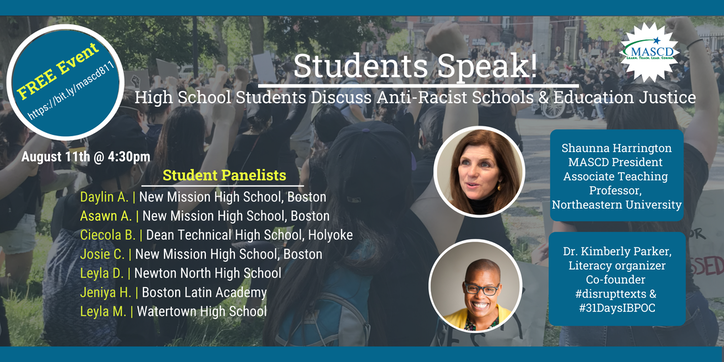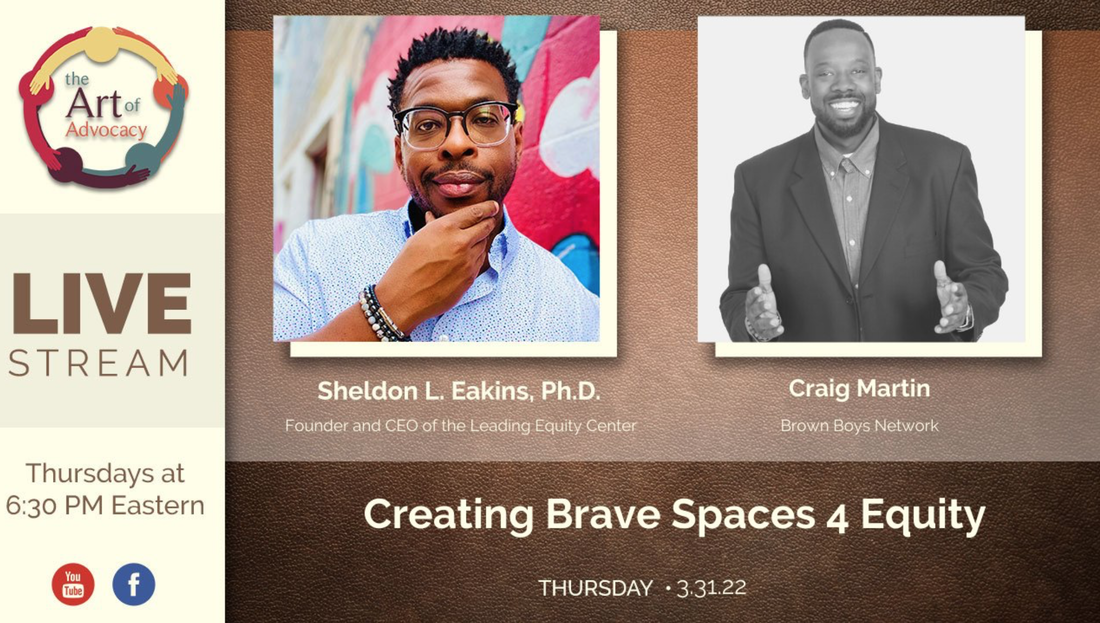|
|
The MASCD is dedicated to equity. In its simplest definition, equity means fairness. Equity and fairness in education is anchored in a commitment to anti-racist and inclusive practices and policies. Equity and fairness in education means all students are provided with the resources and the environment they need to be healthy, safe, challenged, supported, and engaged. We will use our platform and our network to facilitate conversations and learning opportunities about how to expand equity in education. |

MASCD President Shaunna Harrington and Dr. Kim Parker hosted a powerful online discussion with high school students and recent graduates about their experiences and their vision for antiracist schools. We are so grateful to Kim and to the panelists, Asawn, Ciecola, Daylin, Jeniya, Josie, Leyla D., and Leyla M., for working with us. The young people were brilliant and passionate, and reminded us all why we are in education. MASCD is continues to use our platform to amplify the voices of young people. Their ideas and their critiques need to be heard more loudly and clearly in our discussions about our curriculum, instruction, discipline policies, and overall school culture.
Here are some of the comments the students made that Kim captured in the live tweets she made during the discussion:
Follow Dr. Kim Parker on Twitter @TchKimPossible and the hashtags #disrupttexts & #31DaysIBPOC
Here are some of the comments the students made that Kim captured in the live tweets she made during the discussion:
- "Racism is not supposed to be a comfortable subject."
- "You're not supposed to be comfortable talking about racial issues. It's something that happens to a lot of students of color. It's important to understand that part of it."
- "If you're gonna wait around as a teacher to be comfortable talking about racism, you're gonna be waiting around until the end of time."
- "White teachers should understand their privilege when they're talking about it & where they stand when they're educating students..."
- "We should talk about Black culture, and Black inventions. We should get more in touch with the success of Black people."
- "At my school, we don't read many books about Black people in America...we read Kaffir Boy...Nothing about the Black experience in America...The only book about that was To Kill a Mockingbird and that's the white version of what happened."
- "Teachers can always educate themselves more. As students, we're always learning. Teachers can take the effort to educate themselves more. You can always be reading and watching. There are so many books."
- "Sometimes some teachers don't know the way things progressed to be the way they are today."
- "I don't want to learn about Othello. I want to learn about Angela Davis. I want to learn about these philosophical authors that give me space in a room."
- "Black books are summer reading. We talk about it for a week or so before we have an assignment, and then we don't talk about those books anymore. Incorporating those books during the school year would be more effective."
- "It's also really important to start talking about climate change, because climate change impacts people of color, explaining the impact it's going to have on low-income Black communities..."
- "Use forms of math to calculate, give context to the math that talks about racial issues."
- "Students of color should feel cared for and loved in their school."
Follow Dr. Kim Parker on Twitter @TchKimPossible and the hashtags #disrupttexts & #31DaysIBPOC
|
On July 20th, MASCD hosted a powerful webinar on how to work for racial equity in Massachusetts schools, and 117 people joined us. The large turnout speaks to the strong desire educators have to learn together about how to create and maintain anti-racist schools where all our students can thrive. It was particularly impressive to see with how open and honest the panelists were - how willing they were to acknowledge that they do not always know exactly what to do or how to do it. But all of them shared a clear vision of the importance of making an explicit commitment to being anti-racist, engaging in conversations about racism with students, parents, and the community, and intentionally disrupting racist practices and policies. Here are some of the key strategies that came up in the discussion: o Conduct equity audits of your curriculum to see who is being represented, and who is not being represented. And then make necessary changes. o Identify the competencies students need, at different developmental levels, to work for racial justice. o Articulate a scope and sequence for anti-racist learning to ensure the same consistency across K12 that we expect for any other subject. o Analyze data through the lens of racial equity. o Acknowledge what you do not know and commit to learning. o Create book studies for educators to learn together about anti-racist practices. o Learn to be comfortable with discomfort. o Build networks with other anti-racist educators to support you in your work. Find accountability partners who will help push you in your work. o Acknowledge past and present racism, and the harm students of color have experienced. o Create the space for students of color to discuss their frustration and anger. Listen. o Be non-defensive. o Be brave. |
We are so grateful to our panelists who generously shared their experiences, insights, and strategies for how to advance the work of anti-racist education: Massachusetts school leaders Dr. Michael Morris, Superintendent for Amherst-Pelham; Dr. Marilyn Tencza, Superintendent for Leicester; Dr. Peter J. Cushing, Assistant Superintendent for Medford; Dr. Henry Turner, Principal for Newton North High School; Julie Vincentsen, Principal for Hanscom Primary School in Lincoln; and Craig Martin, MASCD Board member and school leader; and our colleagues from other states who helped broaden our perspectives: Dr. Neil Gupta, Vice President for ASCD; Michelle Moore, public education advocate; and Dennis Griffin, Jr., school leader. And many thanks to our excellent moderators who guided the conversation so skillfully: MASCD President-Elect Matthew X. Joseph and Hedreich Nichols. |
|
MASCD is committed to listening, learning, and facilitating conversations and events around racism and equity in education. This past June, we had the pleasure of gathering panelists from across the country in an online webinar to discuss racism and how to work towards towards equity in our education system. Please watch this powerful discussion and check back to learn about more upcoming events this year.
"This was an outstanding event. So honored to hear these passionate voices and learn." "Incredible panel!" "WOW! This was an AMAZINGLY inspiring, motivating, and thought provoking event. I can't say thank you enough. I look forward to many many more events/conversations!!!" |
|

